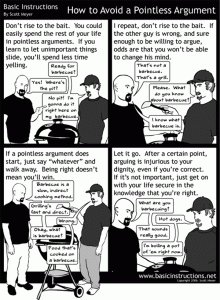It has been said for the past five/six/seven years or so, that I like to argue. I imagine less kind things have been said too. Rather, things that the people saying them thought were unkind. Now, you’d think having a (meaningless) blog (that no one reads [and never gets new posts]) like this would fix any sort of misunderstanding about the Method and the Project, but alas:
Never underestimate the laziness of the average man to correct his own ignorance. (especially when it comes to things that uncontroversially don’t matter, but also with things that do matter).
Now, if you’ve made it through the first few sentences, I suppose you deserve acknowledgement and reward. So here you go.
Moving on, the purpose of this post is to clarify my Method and Project, and thereby to explain what it is that I’m doing with my life that seems to piss so many people off. If you wish to exempt yourself from that boldfaced statement earlier, try to hang in there, especially if you’re one of those people who frequently gets pissed off. If you are one of those people who is easily inflamed, consider skipping to the Project, as it’s the less controversial segment of the two. After you find yourself agreeing with the Project, you can move back to the Method and work your way through.
1. The Method.
As I’m sure you’ve seen, the Method is argument, debate, discussion, etc. It takes place in classrooms, at lunch tables, yes even on facebook. What is the Method supposed to look like? The easy answer, is not like this. But honestly, it’s pretty free form. It only has a few simple requirements. I’ll list them here, in no particular order.
1A. Civility when civility is due. If, for example, someone broaches a topic carefully and earnestly, they ought to be responded to in the same manner. “I strongly believe that every human being has a right to own any kind of firearm they desire. I have yet to see a reason to think that this is not untrue. I am willing to be persuaded otherwise, but until that point, this is my stance and I believe I have arguments in its favor.” Admittedly, it’s not very often you see someone outright say this. But the sentiment can be there regardless of the words. And anytime someone is open to civil discussion, and willing to be wrong and consider counterpoints carefully, they ought to be treated with due respect, even honored for being so careful and meticulous, even if their opinion is something like this.
1B. Parody, challenge, and mockery when met with close-mindedness. You’ve seen people like this, I guarantee it. The people who believe their word is gospel, who have no arguments or reasons to believe what they believe, but espouse it as truth regardless. Not only to these people lack justification for their beliefs, but they push them on others. Not only do they push them on others, but they are unwilling to listen to counterpoint. It often takes the form of the Facebook Bible Statement. Facebook arguments often looks like this. I’m not going to go into the specifics of the image, but you get the idea. The Facebook Bible Statement happens when someone posts an opinion on a controversial topic, knowing they’ll get lots of angry replies, and has no interest in responding to them in one way or another.
“John Parry should be lynched because he’s a ignorant asshole and sports are not overvalued and athletes are super smart.”
Sometimes they look like that. Aside from being unnecessarily violent, ad hominem (we’ll look at that later), this is just a generic statement of opinion. As a facebook status, that’s totally fine. No one wants to read a five page essay on their news feed. What happens with the Facebook Bible Statement, however, comes a bit after this. Some asshole, say, this guy, comes along and does a couple things. He might start by positing his own opinion, or someone else’s that’s counterpoint to the original statement. “Nah, I think he’s on to something. Sports and athletes are overvalued.” Usually, the poster of the Facebook Bible Statement stops reading here. The guy often goes on to posit an argument defending his position, asks what reasons the poster had for thinking the way he was, etc.
The original poster often does one of a few things. He could possibly (1) start yelling at the naysayer, telling them that no one asked for his/her opinion, that they’re stupid etc, or (2) wait until a few other people jump in on the naysayer, and then shut down the conversation by either deleting the original post, or flat out saying that (s)he doesn’t want to discuss the issue.
You can see how this gets in the way of the Method. If the conversation gets shut down, no one is talking anymore. Once we get to the project, it’s obvious how this interferes.
Going back to B, the appropriate response to these sort of reactions (obviously provided the post doesn’t get wholly deleted) is parody. Reductio ad absurdum, it’s appropriate to take the original opinion to a point where it no longer bends. If formal argument isn’t respected, humor occasionally is, at least by some. Going back to the original boldfaced premise, when met with the Facebook Bible Statement poster, often they’re nto going to want to listen to your opinion. Even in parody, it’s unlikely they want to hear it. Some, however, might at least find the humor worth reading through. This isn’t ideal, but it’s certainly better than nothing in terms of the Project. Moving on.
1C. Freedom from obvious flaws of argument. Unfortunately, not everyone is familiar with obvious flaws of argument. Here’s a list (that’s way too long) of most of them. The important ones that show up frequently in argument are these:
Begging the Question, Equivocation, Post hoc ergo propter hoc, Faulty Generalization, No true scotsman, False analogy, ad hominem, appeal to authority, Reductio ad Hitlerum, Straw man, and Slippery Slope. I promise they’re all short reads, about a sentence each and easy to understand. Just didn’t feel like reproducing them here.
Anyway, in order for the Method to function properly, arguments must be free of problems like these. Clearly, if they’re not, than the truth isn’t being pursued and is instead being clouded by a mistake in understanding.
1D. Minimal emotional involvement in the fabric of the discussion. While arguments typically arise because of passionate belief in one position or another, it is necessary to keep them out of the material of the debate itself. Allowing emotions to enter into debate leads to anger, intolerance, and hurt feelings. In order to avoid people getting their feelings hurt during a discussion they’re passionate about, it’s best to keep emotions outside of the argument itself.

This is the appropriate level of emotional involvement in an argument.
1E. Willingness to learn and be wrong. If the Method is working properly, all participants accept the possibility that they have misunderstood a quintessential piece of argument or information that has lead to a faulty understanding. Belligerence and stubbornness have no place in argument. The goal (as I’ll explain in the purpose) is not to win, it’s to understand and learn.
That segways nicely, doesn’t it?
2. The Project.
By “Project,” I mean goals, aims, intentions, purposes of the whole. It’s the whole point of practicing the Method in the first place. I hope that’s clear. Now, let me explain just what the Project is. I’ll start with what it’s not.
2A. The Project is not winning, looking smart, or impressing people. By conducting the Method, you are not trying to win arguments, impress the people hearing the argument or even the people you’re arguing with. Not only will you not be able to do this, but doing so will interfere with segment D of the Method.
2B. The Project is not converting people to your way of thinking. Conducting the Method is not meant to show everyone that you’re right and they’re wrong. You’re not trying to educate the masses, and you’re not trying to “correct faulty thinking.”
2C. The Project is not just about you. The Method is not only meant to give you new perspective. You don’t conduct the Method solely for your own benefit. This is not meant as a way for you to learn as much as you can and horde knowledge.
Now let’s look at what the Project is.
2D. The Project is the accumulation of knowledge, and the destruction of ignorance for everyone. As foolishly idealistic as it is (there’s a reason it’s a Project and not a Goal), part of the Project is eliminating ignorance. It’s partially an education campaign. The conductor of the Method tries to get knowledge from the people he argues with, and give what he knows to them. It’s an exchange of information, and the information naturally weighs itself out until only the good stuff is left. The Method leads to a giant information sifter, the kind you play with at the beach. It lets the shitty stuff fall through the cracks, and keeps the gems for you to share with whoever is listening.
2E. The Project is the sharing of perspective, experience, and understanding. It’s about learning how to put the shoe on the other foot, or whatever the saying is. Even when met with a faulty understanding, the Project means being able to understand why a person might have come to those conclusions, being able to see from their eyes and appreciate the social/environmental and other factors that may have affected (positively or negatively) their understanding of a topic. Even if someone is fundamentally wrong, it’s the job of the conductor of the Method to at least comprehend the (potentially faulty) thinking behind an opinion. Take the Westboro Baptist Church. Take this video. Despite wholly disagreeing with their opinions, Brand manages to understand and hear where they’re coming from. The Church seems to fundamentally believe they are doing a service to the people they haze (for lack of a better word) because they need to be saved. Their intentions are noble, even if their methods are… questionable. That level of understanding can really help to foster part A of the Method. Lacking understanding/not trying to get to understanding leads to belligerent useless yelling.




